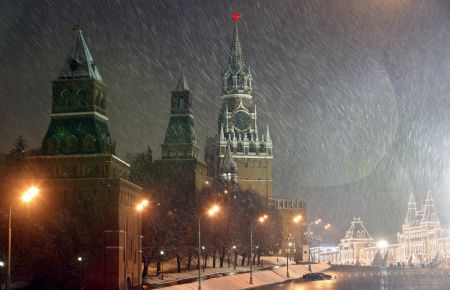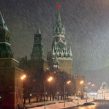
Russia Takes Pause After Incredible Year of Discoveries and Disappointments
Publication: Eurasia Daily Monitor Volume: 10 Issue: 1
By:

Early January is a period of partying and hibernation in Russia. Yet, this pause also provides an opportunity to reflect on the incredible ups and downs of the past year. Designated by the Kremlin as a year of return to stability and growth, 2012 had turned out to be anything but. Russia was largely spared shocking terrorist attacks and catastrophic natural disasters, but millions of its citizens awakened to the injustice of the habitual order of governance and gross corruption of the ruling regime. In political terms, the clamor of the electoral season was supposed to end with President Vladimir Putin’s inauguration in early May, but in fact, it had started with the unexpected breakthrough of street protests in Moscow in early December 2011 and still continues as the next rally is planned for January 13 (Moscow Echo, January 5). These protests have not acquired a truly mass character, but they have changed the political atmosphere and became a powerful catalyst of discontent.
This dissatisfaction-turned-outrage with the self-serving bureaucracy, which has reduced public politics to a farce, is increasingly focused on the person of Vladimir Putin, who had never imagined that his well-orchestrated return to the Kremlin could trigger an explosion of protests. After the initial shock, he opted for the strategy of gradual suppression of the opposition and selective persecution of activists, targeting particularly the more aggressive leftists in order to scare the more impressionable liberals. Irritated rather than frightened by the street carnival, Putin saw the main risk in dissent among the elites and sought to shorten their leashes and discipline the doubters. His instrument of choice against the elites is the investigation of minor corruption cases. And the scandalous dismissal of Defense Minister Anatoly Serdyukov was supposed to demonstrate the brutal effectiveness of this method. Putin also pushed the government and the State Duma to adopt a series of blatantly undemocratic measures, and the legislation banning the adoption of orphans by United States citizens was definitely the most cynical and senseless act of self-denigration (Ezhednevny Zhurnal, December 25, 2012). It has deepened the splits in the elites—who are worried about Putin’s eccentricity and departure from reality—and has damaged beyond repair the legitimacy of the newly-refurbished political construct.
Domestic disturbance has heavily impacted on Russia’s foreign policy, which in 2012 lost all momentum in building a partnership with the West and became self-defensive on every imaginary “front.” The long-envisaged high point of the year—the APEC summit in Vladivostok—was a disappointing non-event, which left the guests rather astonished with the scale of Potemkin construction in the deeply depressed Far East that generated a trail of corruption scandals (Nezavisimaya Gazeta, December 29, 2012). The expected triumph in pulling Ukraine into the Custom Union and fixing a new gas deal did not happen, causing an abrupt cancellation of President Viktor Yanukovich’s visit to Moscow in the last week of 2012 (Gazeta.ru, December 20, 2012). The dominant theme in international relations turned out to be Syria. In the West, the inflexible Russian position is seen as a lost cause. But Moscow is not at all concerned about its apparent isolation and is highly satisfied with having been able to capture prime global attention by doing very little.
Cracks have opened in the petro-economic foundation of Putin’s system of power, and his mantra about steady 3–4-percent growth, which would compare favorably with stagnation in Europe, sounds shallow and self-deceiving. By the end of 2012, Russia’s economy had indeed slowed down to zero, and the massive outflow of capital guarantees that a miraculous acceleration will not occur in the near future (Kommersant, December 25, 2012). The vague proposition of “modernization” has been dropped as incompatible with Putin’s key message of “stability”; the only economic idea left for Russia to explore is thus “re-industrialization” driven by the revitalization of the defense-industrial complex, which demands a lot of money but shows few signs of vitality. Putin cannot curtail the system of economic populism he has created. But increasing taxation of the oil and gas sectors is becoming the only viable source of government money to finance the lavish subsidies that the president’s core support base has come to rely on. The oil industry is now heavily dominated by Igor Sechin’s Rosneft, which in December acquired the joint venture TNK-BP to become an awkward behemoth saddled by huge debts, so tax breaks are badly needed. The gas sector, meanwhile, is affected by Gazprom’s escalating troubles in the European market where it faces pressure for lower prices from consumers, a defection of old partners, as well as probes launched by the European Commission. The collapse of the Russia Arctic Shtokman project, which saw plenty of Putin’s “manual management,” was perhaps the greatest economic setback of 2012.
Political crisis has so far developed out of sync with economic spasms, but the motley crowd of Russia’s “non-systemic” opposition can nevertheless claim that it has emerged as a real force that can draw on various sources of discontent. The newly-elected Coordination Council is yet to prove its capacity to unite anti-Putinists of different persuasions, but it has settled into a mode of forging compromises between factions and is growing into the role of a headquarters of a sustained campaign in which every next action could become a decisive battle. What makes their political work more effective is the astounding fact that Putin has no idea about the spectacular growth and bold libertarianism of the Russian blogosphere (and his courtiers are in no rush to enlighten the boss), so the “patriotic” intentions to take the Internet under control remain ineffectual.
The political awakening of 2012 has far more features than just street protests in Moscow and consensus-by-quarrel in the Coordination Council. The blossoming of the volunteer movement after the spontaneous response to the Krymsk flooding in July (see EDM, July 11, 2012) is as much a part of it as is the outrage in the pop-culture world against the persecution of the young women who made the name Pussy Riot into a global brand. A widespread mood exists for packing suitcases and opting out of the oppressive gloom of Putinism, but the awakening brings millions of people new hope that they will finally be able to claim Russia as their own country. The question “How to get rid of Mr. Putin?” cannot be relegated to natural causes.




